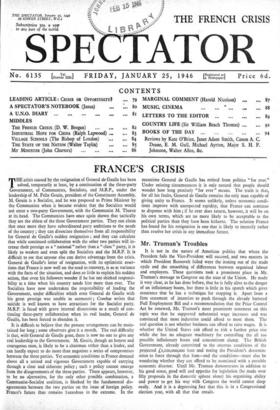Mr. Truman's Troubles
It is not in the nature of American politics that where the President fails the Vice-President will succeed, and two matters in which President Roosevelt failed were the ironing out of the trade cycle and the smoothing of differences between organised labour and employers. These questions took a prominent place in Mr. Truman's message to Congress on the state of the Union. He made it very clear, as he has done before, that he is fully alive to the danger of an inflationary boom, but there is little in his speech which gives assurance that he has a technique for stopping it. Apart from a firm statement of intention to push through the already battered Full Employment Bill and a recommendation that the Price Control Act be renewed, Mr. Truman's most prominent statement on this topic was that he supported substantial wage increases and was convinced that most industries could afford to meet them. The real question is not whether business can afford to raise wages. It is whether the United States can afford to risk a further price rise while she has no adequate machinery for controlling the all too possible inflationary boom and concomitant slump. The British Government, already committed to the onerous conditions of the projected £1,100,000,000 loan and noting the President's determin- ation to force through that loan—and the conditions—must also be wondering whether they can afford to be associated with a possible economic disaster. Until Mr. Truman demonstrates in addition to his good sense, good will and appetite for legislation (he made over fifty proposals in the domestic sphere alone) his organising ability and power to get his way with Congress the world cannot sleep easily. And it is a depressing fact that this is in a Congressional election year, with all that that entails.






























